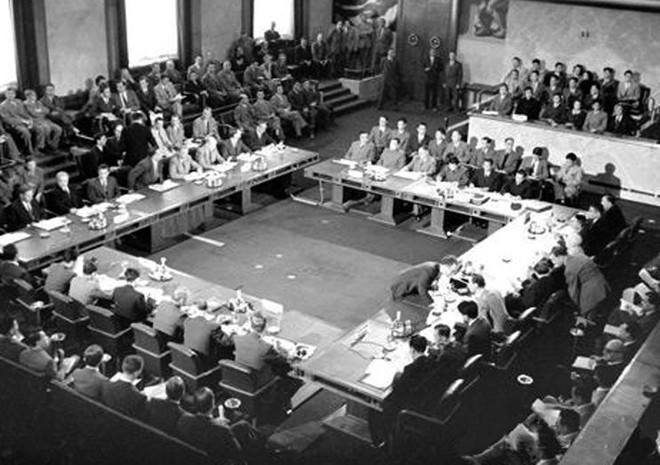(VOVworld) - One day after the Dien Bien Phu Victory, the Geneva Conference on ending wars and restoring peace in Indochina opened in Geneva, Switzerland on May 8, 1954. After 75 days of official negotiations and a range of informal diplomatic activities, on July 20, 1954, the Geneva Agreement on a ceasefire in Vietnam, Laos, and Cambodia, was signed. For the first time in history, major countries had to recognize the fundamental national rights of Vietnamese people including independence, national sovereignty, and territorial integrity. The French military had to withdraw from Vietnam. To mark 60 years of the agreement’s signing, VOV brings you the gist of an article by Deputy Prime Minister and Foreign Minister Pham Binh Minh entitled “Geneva Conference 1954 – Lessons for Vietnam’s diplomatic sector”.

The Geneva Conference in Switzerland on May 8, 1954
|
The Geneva Conference on Indochina had the participation of 9 official delegations: Britain, France, the US, the Soviet Union, China, the Democratic Republic of Vietnam, Laos, Cambodia, and the Bao Dai administration. The Geneva Agreement consisted of 3 documents: the last Geneva Statement on restoring peace in Indochina and 3 Agreements on the cessation of hostilities in Vietnam, Laos, and Cambodia. The Geneva Agreement declared that countries respected the independence, sovereignty, unification, and territorial integrity of Vietnam and not intervened into Vietnam’s internal affairs. The military demarcation line (the 17th parallel) was temporary and not a political or territorial demarcation line and Vietnam would hold a general election to reunify the nation in July 1956.
National interests were the utmost targets and principles
The Geneva Conference was the first time Vietnam’s diplomatic sector participated in a complex multilateral negotiation which was dominated by major players.
Consistent with the fundamental goals of independence, sovereignty, unification, and territorial integrity, Vietnam insisted on achieving a comprehensive solution on both military and political aspects.
Military solutions included a ceasefire agreement, the withdrawal of foreign troops, and restoring peace in Indochina. Political solutions were to ensure peace, independence, unification and territorial integrity of Vietnam, Laos and Cambodia and end the French colonial rule in Indochina.
Right from the beginning of the conference, the Vietnamese delegation proactively conducted various diplomatic contacts. Besides the struggle on the negotiating table, Vietnam discussed separately with the Soviet Union, China and France, organized press conferences, and met with hundreds of French social and political organisations to show them Vietnam’s goodwill and determination, and criticized the aggression and conspiracy of hostile forces. These sideline diplomatic activities contributed to forcing the French government to accept a comprehensive solution for Vietnam and Indochina. The conference documents stated that the demarcation line was temporary and after two years the two regions would hold a general election to unify the nation.
Independence and self-reliance in external affairs
The Geneva Conference was initiated and organized by powerful countries who strived to induce and pressure Vietnam to accept a solution that would benefit them. The Democratic Republic of Vietnam came to the conference as the winner of the Bien Dien Phu battle and clearly had in mind their negotiation goals. But big countries always intervened and manipulated the negotiation plans, the beginning and concluding times, and coordination among assigned forces during the negotiations. In such context, the lesson of holding firm independence and self-reliance in diplomatic negotiations in the Geneva Conference is extremely precious.
Wining step by step, taking advantage of international support
Vietnam, who understood its real strength, the interests of powerful countries including the Soviet Union and China, and the global situation, decided to sign the Geneva Agreement with provisions inadequately reflecting Vietnam's victory on the battlefield. The decision was an example of the gradual win of Vietnam’s foreign policy. Vietnam’s victory was based on the principles that big countries respected Vietnam’s independence, sovereignty, unification, and territorial integrity. It gave Vietnam a new status toward achieving the ultimate goal of national liberation and unification.
Combining diplomatic struggle and public communications to rally international support is another lesson. Vietnam’s efforts for peace, national independence, unification, and territorial integrity matched the common aspiration of progressive people worldwide including the French. 60 years have passed, the world, the region, and Vietnam have experienced various changes. Peace, cooperation, and development have become major global trends. But global complications have posed many challenges to national security and development. In this context, lessons from the Geneva Conference remain their values in maintaining peace and national defense.